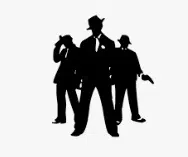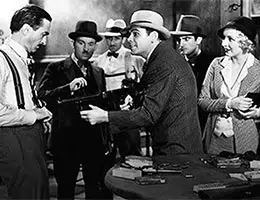 The notion of mafia is used to name a clandestine and criminal group . At first the term referred specifically to criminal organizations in Sicily ( Italy ), although it later began to be used to refer to any group of this type.
The notion of mafia is used to name a clandestine and criminal group . At first the term referred specifically to criminal organizations in Sicily ( Italy ), although it later began to be used to refer to any group of this type.
The mafia, therefore, is a gang dedicated to organized crime . The relationships between the members are governed by the so-called "codes of honor" , the violation of which is usually harshly punished by the other members, even with death .
Cosa Nostra and the Camorra are the best-known mafias in Italy . The leader of these gangs is known as a don : he is the person who occupies the highest place in the association 's hierarchy.
There are, however, mafias in most countries . The Chinese mafia , the Japanese mafia and the Albanian mafia are among the most dangerous in the world.
The functioning of the mafia became popularly known from fiction . Mario Puzo , with his novel The Godfather , narrated the experiences of the Corleone family and showed several of the actions that gangsters usually carry out. When the book was adapted to film by Francis Ford Coppola , the story became famous throughout the planet.
A society or group that, when defending its interests, acts without scruples is also often called a mafia. In these cases, it is not organized crime, but rather activities and conduct that are carried out without ethics and, sometimes, even outside the law.
Paul Veyne , a French historian of the first half of the 20th century, there was a very well-structured mafia in the Roman Empire, where the law of the strongest reigned. At that time, the weakest could only survive if they adhered to political clientelism .
An exchange of favors that is carried out outside the official sphere, that is, outside the law, is known as political clientelism (or simply clientelism ). This is the promise of loyalty in exchange for certain services. In the specific case of the mafia, for example, many individuals manage to avoid being killed through a "donation" that they must fulfill regularly.
Returning to the Old Empire, acts such as fraud, physical violence, theft, rape and fraud, among others, were not considered criminal crimes, but civil ones; Furthermore, since there was no police force, each individual had to defend himself.
 The role of the judges was limited to directing the process so that the jury could make a decision regarding the degree of guilt of the accused, but it was the victim himself who had to search for it and even carry out the sentence. In other words, there was no public power that could limit personal revenge.
The role of the judges was limited to directing the process so that the jury could make a decision regarding the degree of guilt of the accused, but it was the victim himself who had to search for it and even carry out the sentence. In other words, there was no public power that could limit personal revenge.
The Roman Empire was not a State but the domain was in the hands of the clans ; each chief offered protection to those who followed him. In each region, in addition, there were different jurisprudence, and this was what the Law of that time consisted of.
For several centuries, a feudal system reigned in Sicily based on the exploitation of hundreds of peasants in favor of a few leading a comfortable life. It is believed that these factors were decisive for the birth of the mafia. Furthermore, given that it was a society that granted privileges only to wealthy landowners, crime was the only way for the rest to aspire to obtain them.
Since there was no organized government structure with the authority to protect citizens, they were forced to strengthen ties with their families to protect themselves. This explains why family is so important to the mafia.
